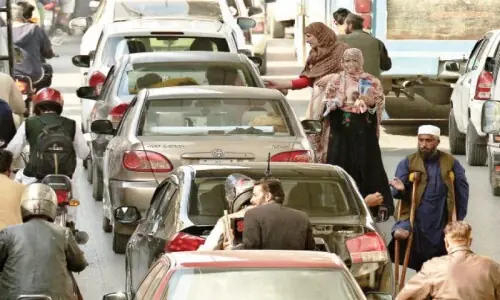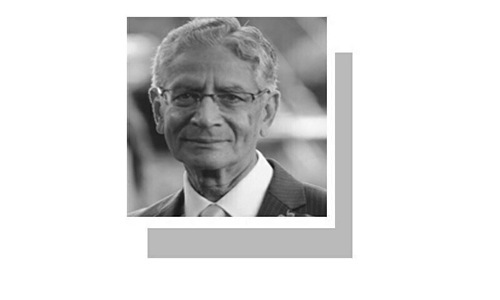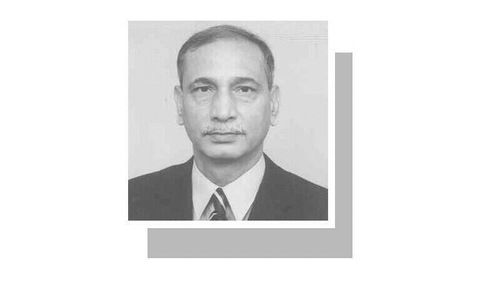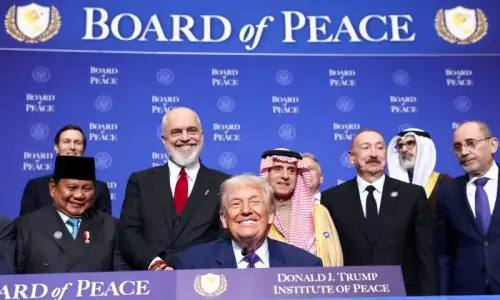President Dr Arif Alvi on Saturday returned two bills seeking to reverse the controversial changes made in the election laws by the previous PTI government regarding the use of electronic voting machines (EVMs) and i-voting for overseas Pakistanis and clipping the vast powers of the National Accountability Bureau (NAB), to the prime minister for "reconsideration and detailed deliberation by the parliament and its committee(s)".
Both bills were passed by the National Assembly and the Senate last month. After their approval from both houses, only the president's assent was required for them to become law.
However, President Alvi returned the bills today, saying that they had violated Article 46 of the Constitution, according to which the prime minister "shall keep the president informed on all matters of internal and foreign policy and on all legislative proposals the federal government intends to bring before Majlis-e-Shoora (parliament)".
The president was not informed about the legislative proposals before bringing the bills to parliament, a statement from the President's Secretariat said. It added that the bills were passed by the NA and the Senate on May 27 and 29 in haste and without due diligence.
"The legislation, having a far-reaching impact on the society, should have been discussed in detail in consultation with the legal fraternity and civil society," the statement said.
The president also highlighted specific objections to each bill.
Election reforms bill
He noted that the Supreme Court, in a 2018 judgement, had upheld its verdict from 2014 granting voting rights to overseas Pakistanis. The court had also endorsed i-voting and declared it to be safe, reliable and effective, he added.
Furthermore, the Supreme Court had approved the use of i-voting in a pilot project.
"The court clearly observed, 'We direct the results of the by-elections and the vote count of the votes cast by overseas Pakistanis through the i-voting mechanism shall be kept separately and also secret till the time that ECP (Election Commission of Pakistan) is satisfied about the technical efficacy, secrecy and security of the votes cast by overseas Pakistanis through the i-voting system'."
In its 2018 judgement, the apex court had regretted that the i-voting system was not used despite its earlier verdict, Alvi stated.
He also rejected the possibility that EVMs could be hacked. The president compared the i-voting system to digital financial transactions and stated that "the probability of a plane crash is thousands of times higher than the probability of hacking of a digital transaction today".
"With very secure digital payments solutions already existing, and with more than $8 trillion transacted daily, the same processes can ensure anonymity and security of the vote and can also be subjected to complete audit on the truth-match of the vote cast."
President Alvi said that Pakistan's EVMs were unique because they combined the paper-based system of voting already in use along with the electronic method. There was "no risk" involved, he emphasised and added that the parliament could legislate that if there was a discrepancy or dispute, the paper count would be preferred over the electronic count or vice versa.
The stigma of rigging was attached to every election in the country which reduced the incoming government's credibility and billions were lost in litigation and confrontation, he pointed out.
"The new amendments in this form are like taking one step forward, and then panicking and taking two steps backward. Changing them back is tantamount to unnecessarily delaying these technical processes for the advancement and transparency of elections."
According to the statement, the president said that parliament should not regress when making such laws and instead, improve them within a timeline to ensure that they were implemented.
NAB law
President Alvi said that if the amendments to the NAB ordinance were enacted as proposed, the ongoing mega-corruption cases in the courts would be rendered infructuous.
"Therefore, the proposed amendment which should have strengthened the accountability mechanism to eliminate corruption and political engineering to ensure good governance in the country has been rendered a toothless entity."
Under the amendment, the burden of proof had shifted to the prosecution because of which it had become similar to the Code of Criminal Procedures, he said. The amendment would make it impossible for the prosecution to prove cases of corruption and misuse of official authority by people and would bury the process of accountability, he added.
The president said the amendment would make the process of tracing the money trail for illegal properties "almost impossible" especially since property records were not digitised.
"Such amendment is also against the spirit of Islamic jurisprudence where Caliph Hazrat Umar was questioned by an ordinary citizen to explain the extra cloth for his long cloak and against various accountability laws of developed countries such as Swiss Foreign Illicit Assets Act 2010 and Unexplained Wealth Order 2018 of UK in White-collar Crimes."
The government had presented the two bills amid talks about the possibility of early elections in the country and hours after PTI chairman Imran Khan abruptly ended his long march by giving a six-day deadline to the government to announce the election date.
Amendments
The NAB (Second Amendment) Bill 2021 has suggested that NAB's deputy chairman, to be appointed by the federal government, would become the acting chairman of the bureau following the completion of the tenure of the chairman.
The bill has also reduced the four-year term of the NAB chairman and the bureau's prosecutor general to three years.
After approval of the law, NAB will not be able to act on federal, provincial or local tax matters. Moreover, the regulatory bodies functioning in the country have also been placed out of NAB's domain.
It says that "all pending inquiries, investigations, trials or proceedings under this ordinance, relating to persons or transactions … shall stand transferred to the concerned authorities, departments and courts under the respective laws."
The new law has also set a three-year term for the judges of the accountability courts. It will also make it binding upon the courts to decide a case within one year. Under the proposed law, it has been made binding upon NAB to ensure the availability of evidence against an accused prior to his or her arrest.
According to one of the key amendments, the act "shall be deemed to have taken effect on and from the commencement of the National Accountability Ordinance 1999".
Under the amendment to Section 94 of the Election Act of 2017, the ECP may conduct pilot projects for voting by overseas Pakistanis in by-elections to ascertain the technical efficacy, secrecy, security and financial feasibility of such voting and shall share the results with the government, which shall, within 15 days from the commencement of a session of a house after the receipt of the report, lay the same before both houses of parliament.
Under the amendment to Section 103 of the Election Act, the ECP may conduct pilot projects to utilise EVMs and the biometric verification system in by-elections.


































